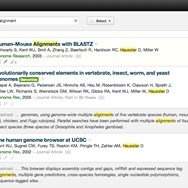

MENDELEY CHROME EXTENSION FULL
Mendeley Web Importer, a browser extension that imports metadata and retrieves legal full text scholarly articles discovered on the Web.Mendeley Reference Manager (Beta), a replacement reference manager built with Electron that also runs on Microsoft Windows, Mac, Linux, and all major web browsers.

Mendeley Desktop, the original reference manager based on the Qt framework that runs on Microsoft Windows, macOS, and Linux.The literature search function in the desktop application has also been removed. On Mathe Mendeley mobile app is being removed from the Apple App Store and Google Play, leaving access via the web site or Mendeley Reference Manager on the desktop. On, Mendeley announced two new products: Mendeley Reference Manager and Mendeley Cite. In October 2016, Mendeley Careers was launched to help researchers locate job opportunities. In April 2016, Mendeley Data, a platform for sharing citable research datasets online, was promoted out of beta. The functionality was subsequently incorporated into Mendeley Feed and Mendeley Profile. On 12 January 2015, Mendeley announced the acquisition of Newsflo, a service which provided links to press coverage of researchers' work. On 23 September 2013, Mendeley announced iPhone and iPad apps. Extensions to product line Īfter acquisition, Mendeley subsequently extended its product line into new areas while continuing to iterate on its reference manager.

This was contrasted to a non-profit service like Unpaywall, which marketed itself as not susceptible to a sell-out to Elsevier. ĭavid Dobbs, in The New Yorker, suggested Elsevier's reasons for buying Mendeley could have been to acquire its user data and/or to "destroy or coopt an open-science icon that threatens its business model." The sale led to debate on scientific networks and in the media interested in Open Access, and upset members of the scientific community who felt that the Mendeley's acquisition by Elsevier was antithetical to Mendeley's open sharing model. The deal price was speculated to be €50 million (US$65 million). Mendeley was purchased by the academic publisher Elsevier in early 2013. The recommendation was revoked after Elsevier bought Mendeley. In 2012, Mendeley was one of the repositories for green Open Access recommended by Peter Suber. Mendeley won several awards in 2009 including "European Start-up of the Year 2009", TechCrunch Europas "Best Social Innovation Which Benefits Society 2009", and The Guardian ranked it #6 in "Top 100 tech media companies". Victor Henning and Jan Reichelt receiving the Plugg "European Start-up of the Year" award, 2009


 0 kommentar(er)
0 kommentar(er)
